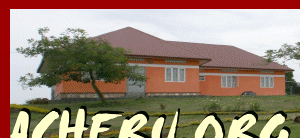|
|
| Circular - March 2021: Information on Acheru staff |
| There have been many staff changes since we established Cherub and then Acheru. For some staff, perhaps recently qualified, Acheru might be their first job. Despite lacking experience, they bring enthusiasm and new ideas. But we need experienced staff at Acheru too, and several staff members, there from the start, have become central to the work. It's their wisdom, gained over the years, which keeps everything running smoothly, setting the example that younger staff members can learn from. |
| Joyce Kayaga Kalinda - Administrator |
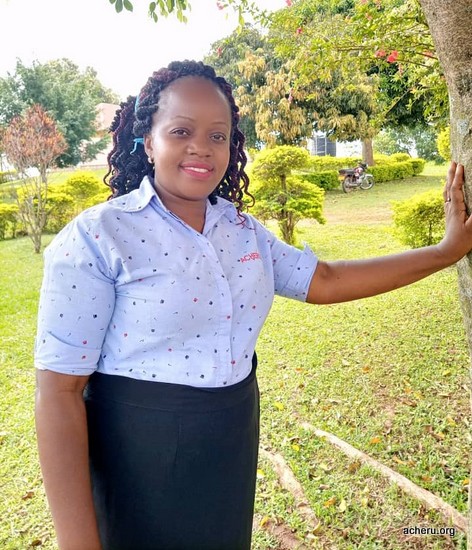
|
| Joyce is married to Paul, a teacher of English Literature, and with their four children they live on site at Acheru. She is in overall day to day control at Acheru, where she serves as secretary to the board, and also reports to Africare, providing us with accounts, reports, and case histories. She has a nursing background and has a degree in health administration so has the necessary background and skills to manage Acheru. I'm not sure if there's a written job description for Joyce's position, the job has 'evolved' as Acheru has grown. While the board have overall responsibility for Acheru, it's Joyce who must implement policy decisions. |
| An important and demanding part of her role is ensuring compliance with all relevant legislation. There are risks in dealing with very sick children and it's vital that everything is done 'by the book', from ensuring Acheru meets the standards set for their Ministry of Health accreditation to dealing with income tax And pensions legislation. |
| Joyce says: "I went to village schools. I remember my interview from nursery to primary one was written on the floor. I was brought up by my auntie who was a nurse and midwife. She trained from Mengo Nursing School in the 50's. Many people who know that background think that she might have suggested to me to become a nurse but this is not true. She always discouraged me because she used to earn little and had to work overnight. She said 'I do not want you to go through the same suffering'. Whenever I was with my friends I would play at being a nurse, and they would play as teachers. |
| I was contacted when Cherub needed an administrator to replace Denise Kane. I attended interview, and October 30th 2005 I started working there. My exposure to children with disabilities taught me to always appreciate God for who I am, as a mother; to appreciate God for my children and as an administrator to extend my love to the hopeless child with any disability". |
| Harriet Nakabuye - (on left) Community Based Rehabilitation |
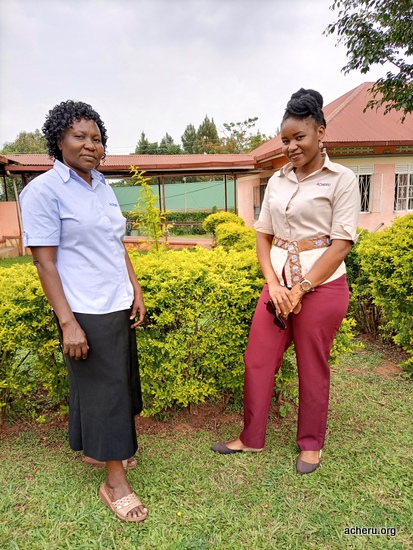
|
| The very first Cherub employee. No job description existed at that time, we needed someone to care for the first patients and Harriet was the only applicant. Starting as a 'carer', Harriet soon took on more responsibility, helping with clinics, looking after finance, and completing training in Community Based Rehabilitation. It's the community work which is now Harriet's primary responsibility. |
| She serves on the board, handles much of the day to day bookkeeping, and has a firm grip of the detail of running Acheru, working very closely with Joyce. Harriet now has considerable experience in the community and has developed medical skills, assisting when required with various procedures. Harriet is also responsible for the Acheru workshop, making aids and appliances for disabled children. It is varied and demanding work, particularly when encountering sickness and deprivation in the community and having to make decisions on how people can be helped. |
| Harriet says: "Though community work has contributed a lot to the progress of our work as a unit, it also has challenges like: heavy rains, very narrow roads, poverty in families, too much dust, having wrong addresses, moving to new addresses and not informing us. Sometimes I come back happy following the testimonies heard from patients and parents, and other times I come back depressed and stressed following conflicts in homes, broken marriages, and death following negligence". |
| Nakabugo Rose - (on right) Social worker |
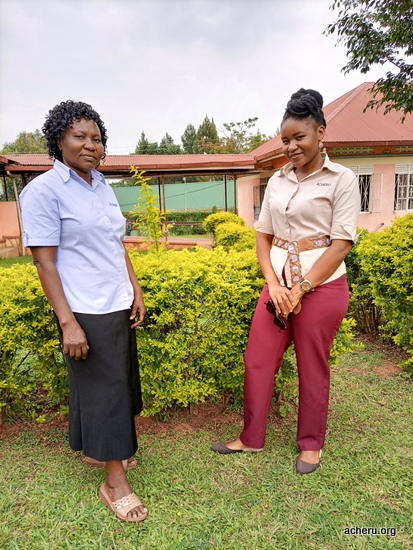
|
| Work in the community means dealing with much more than medical needs; if a patient is to be successfully rehabilitated we have to consider the environment the child is returning to and how the family will deal with their needs. This may require simple instruction, or it may be much more complicated if the child had previously been rejected because of their disability. There's also poverty; are the family actually capable of providing a suitable home for the child? Rose has to deal with all these issues, and this means making difficult decisions while allocating any available resources. |
| Rose came to Acheru first as an intern from Kyambogo University, and was impressed by the work. It was also clear that Acheru needed a social worker to work alongside Harriet in the community, so she joined us on completion of her degree. |
| Isaac Watum - Nurse |
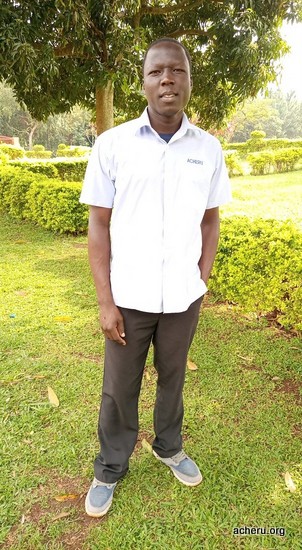
|
| Isaac hasn't been with us for very long so his experience is limited, but at Acheru he was immediately faced with a lot of responsibility as our only nurse. He has risen to the occasion and is clearly dedicated to his work. From northern Uganda, Isaac completed his nursing and midwifery training in Gulu, gaining an enrolled nursing certificate. He is responsible for pre op and post op care of inpatients as well as a range of outpatient treatment. He lives in an Acheru apartment, to be available when needed - a small unit like Acheru requires flexibility from the staff. Being the only nurse means a lot of responsibility being placed on Isaac - although we shouldn't forget that other 'non medical' staff members have worked at Acheru long enough to be able to assist in the treatment room. The main part of the work load will inevitably be changing dressings. Most of the inpatients will have had surgery, correction of a deformity, or burns, and daily dressing will be required. It is a testament to the quality of the work that this is all carried out with very few infections. This is particularly noteworthy when looking at the severity of some of the wounds being dressed - neglected osteomyelitis in particular is very demanding to work with. Isaac believes his call from God is to serve the children socially, physically, mentally, and emotionally, and in the future, as well attaining further qualifications he wants his work with children to be high quality and 'memorable'. |
| Matayo Katongole - Compound attendant/workshop assistant |
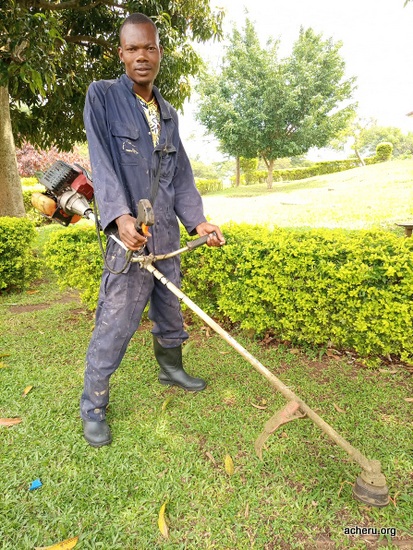
|
| There are 'high profile' jobs at Acheru, and also more 'ordinary' tasks which are nevertheless important. With all that goes on the compound could become very untidy, so cleaning is an issue, and we are keen that everyone working there, whatever their job, can identify with the work and feel they are part of it. Many of the patients will be playing outside too, and staff working in the compound can interact and get to know them, all these different elements adding together to in effect make Acheru greater than the sum of its parts. Matayo has other responsibilities too. Harriet produces various appliances - walking aids, CP chairs etc - in the Acheru workshop, and Matayo helps produce a wider range of equipment and furnishings, saving a lot of money. |
| Sserunkuma Joseph - Cook |
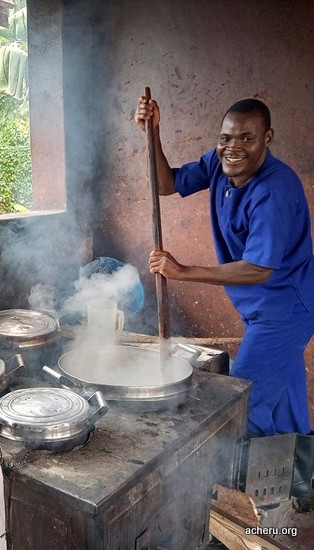
|
| Joseph, a young single man, has a certificate in catering and cooks for the Acheru patients, carers, and staff. Particularly before clinic days there can be large numbers of people to be fed, and the quality of the food is important for recovering children. He stays in workers accommodation at Acheru and like other non-medical staff there, enjoys getting to know the children and being part of the 'family'. |
| Ochan Nicholas - Physiotherapist, Minakulu and Kabembe |
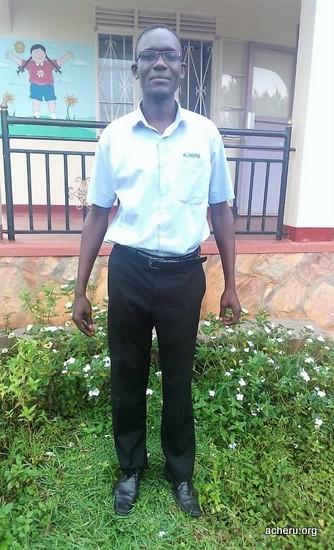
|
| While working as part of a team, the work of Ochan is central to the treatment and rehabilitation of Acheru patients. Children with club feet or cerebral palsy may be treated as outpatients, and the changes can be dramatic. People in the community may see a child with a severe disability which they believe cannot be treated, and yet regular outpatient treatment, without the need for hospital visits, surgery, or medication, can bring very visible results and change the child's life. A child with CP, possibly previously abandoned in the corner of a hut, is enabled to stand, thus looking people in the eye and totally changing their perception of him, and resulting in them getting the attention and stimulus they need to develop their full potential. A child crippled by club feet can have the deformity corrected, often without any surgical intervention, enabling them to walk without pain, go to school, engage in all normal day to day activities. |
| Ochan also works at Minakulu, dividing his time between the two sites and serving as the link to Acheru over a very wide area. Statistically, the number of referrals from the north is small but this doesn't reflect the dramatic changes among those who are treated or the impact on communities of the clinics organised by Ochan for visiting teams from Acheru. |
| Walter Chelanget - Day security guard, and Waswa Samuel - Night Watchman |
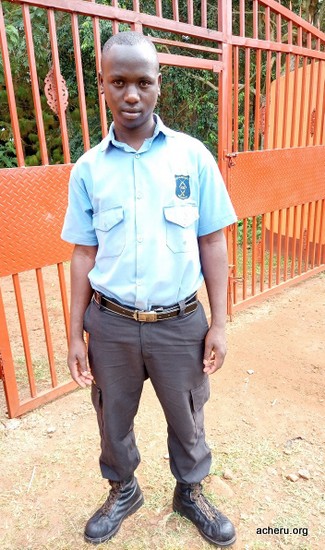
|
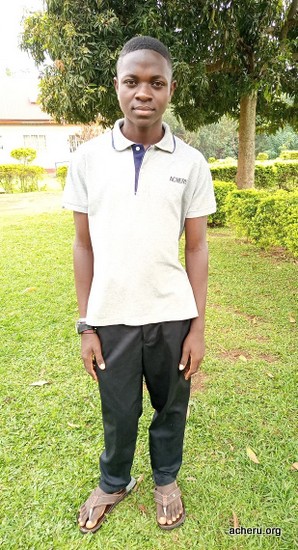
|
| Acheru is on a five acre site at Kabembe where we have a range of buildings for the work and for staff accommodation, valuable equipment, animals, vehicles, and lots of people coming and going. We are fortunate in having good relations with neighbours, there are small farms and schools around us so anything out of the ordinary might be noticed. The local police also take an interest and look in from time to time. The main concern is monitoring the visitors coming on site to ensure they are all genuine, so Walter guards the gate to check everyone coming in and out, and at night the site is patrolled by Samuel. Walter has completed O levels and would like eventually to train as a teacher. We have a security fence, though its main purpose is keeping our own animals in and wild animals out. The best protection for Acheru is ensuring we 'belong' as part of the local community, so everybody watches out for each other. |
| Mwaita Brian - Teacher |
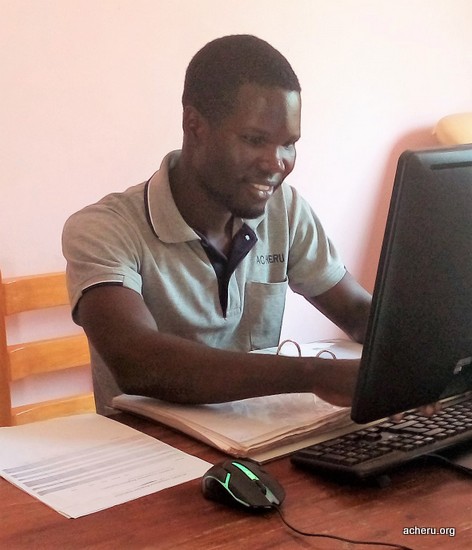
|
| The first born of his mother's two children, his mother and younger brother died from Aids. His father had eight children with another wife, and Brian grew up with his stepmother. Brian has a certificate in Information Communication Technology, with two years experience in IT services and four years teaching. As well as teaching, Brian is responsible for IT at Acheru, which is increasingly important for communication, record keeping, and also keeping up to date with medical techniques. He has a keen interest in Christian and charitable work and wants to be an inspiration to children and youth. |
| The work of the teacher is much more varied at Acheru than he could expect to find in any school. The ages range from babies to older teens, some have been attending school for years, others may never have been able to attend school. At Acheru, we have to try to minimise disruption to a child's education, try to prepare children for school who have never previously been able to attend, and also take the opportunity to do something useful with the carers who accompany the children to Acheru. Brian must work, with very limited resources, across a wide range of ages and abilities, and possibly different languages. His enthusiasm goes a long way in enabling him to undertake work which would deter many others, but we also want to do all we can to improve educational resources by enlarging the classroom and providing teaching materials and a library. |
| Nankinga Rebecca - Receptionist |
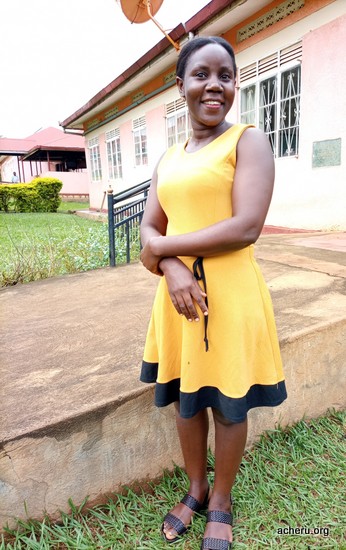
|
| From a family of two girls and one boy, has a degree in social development from Makerere University. |
| The first point of contact for most people coming to Acheru, Rebecca needs the skills to put them at ease and discuss what Acheru can do, presenting a professional attitude and giving them the confidence to entrust their child to us. She welcomes them, passes on information to the appropriate staff members, and compiles records. |
| Nakalema Margaret - Matron |
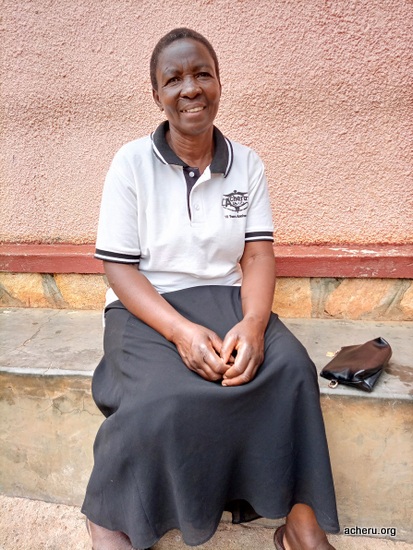
|
| The medical work undertaken at Acheru, and the outcomes, tend to be very visible. The work in the treatment rooms, the physiotherapy department, the classroom, the workshop, the clinics. There's also the community work, and the administration, all essential to the work of Acheru. But there's other work done in Acheru without which the work couldn't go on. There can be up to 37 inpatients plus their carers staying there for varying periods of time, all needing to be washed, dressed, fed, made to feel as if they belong there. Margaret is also responsible for the wards, hostels, and guest house. Her title is 'matron', we might understand it better as 'housekeeper', but it's more than that, and Margaret is available for any problems which might arise. She lives in a small apartment in the inpatient building with Daisy, a patient she adopted when she couldn't be cared for by her family, so is on call day or night should a need arise. |
| Margaret, unable to follow her chosen career of nursing because of the fees, first started work for us as the guest house cleaner at Besaniya; before that she had been struggling to make any money. But being poor didn't mean she lacked determination, and Margaret had already trained as a child evangelist with ECM. At Besaniya, her willingness meant she soon did much more than her defined job and as well as helping with children she could lead devotions and became unofficial chaplain to the staff. Then in Cherub, and later Acheru, she gained sufficient knowledge to be able to assist with treatment of the children. |
| Margaret says: "In 2004 I was appointed to assist in the guest house and do cleaning at Besaniya children's home. Being an evangelist I also led morning devotions for Cherub children and Bible studies on Wednesday and Saturday. I enjoyed my work until May 2009 when I shifted to Kalagi to work as matron and assist the staff in the treatment room. I enjoy ministering to children, so I am in the right place. Assisting in the treatment room has put me close to my chosen career of helping the sick. God is good all the time! When he begins a good work in you He makes sure he accomplishes it." |
| Buyinza Ronald - Orthopaedic clinician |
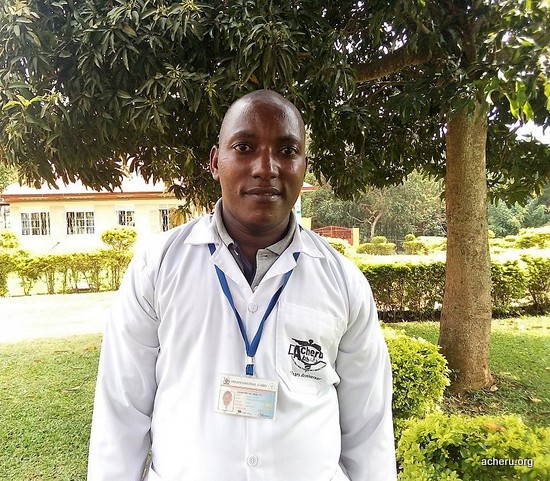
|
| Ronald is the first born of three of his mother's children, and the fourth of his father's 25. Many of our staff are from very large families, perhaps from a rural subsistence farming background, and it's often a testimony to their determination that they are able not just to attend school but go on to attain professional qualifications. |
| At Acheru Ronald is responsible for the diagnosis of children, and referrals for plastic and orthopaedic surgery. He carries out manipulation and casting where appropriate for club feet, post injection paralysis, fractures and other conditions, and compiles statistical data. Ronald is also responsible for provision of orthotics and prosthetics. He takes a keen interest in his specialism and tries to keep up with current literature and research. In his free time he enjoys writing, listening to music, and Bible study, and would like to become involved in politics in the future. |
| Kose Brenda - Accountant |
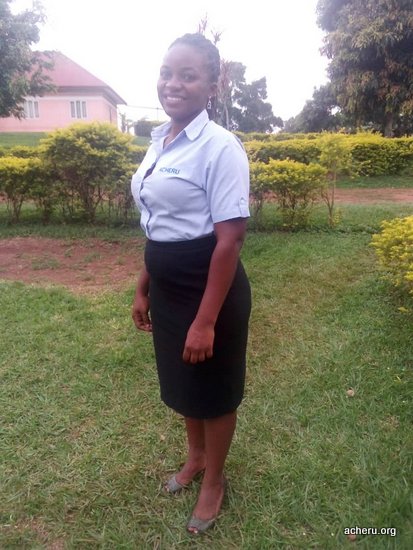
|
| The third of four children, raised by mother after the death of her father, Brenda has a degree in accounting and finance. |
| Over and over, we have seen the failure of projects in Uganda with the common cause almost invariably being money - whether through deliberate dishonesty, simple mismanagement, or overreaching through misguided enthusiasm. It has been vital that Acheru provides proper accountability to Africare, enabling us in turn to give guarantees and assurances to donors. Joyce controls the overall financial strategy, Harriet handles much of the day to day finances, but then Brenda must keep the accounts. Dealing with so many people there's a lot of detail involved, and her work must be handled meticulously so that full accounts can be provided monthly for Africare, and to facilitate effective financial planning at Acheru. |
| Samuel Kakooza - Farm manager |
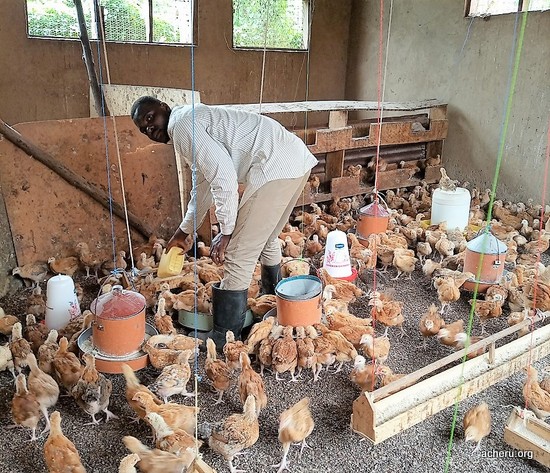
|
| Samuel lives at Acheru with his wife Jane and three children, Jane helping with looking after the farm and poultry. Nutrition is important to a child's recovery, but with so many children and carers to be fed at Acheru cost is a major consideration. Maximum use is now being being made of the Acheru site to provide food, whether from growing crops or keeping animals. It all looks very far from what we would think of as a medical facility but it is effective, with cows, goats, pigs, chickens, and various crops. The work of the farm manager is therefore important to the smooth running of Acheru, and the children's recovery. |
| Omara Bosco - Station Assistant, Minakulu |
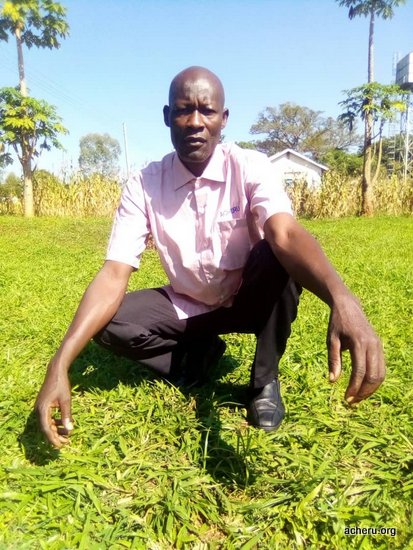
|
| Omara is presently our only full time worker at Minakulu, as the physiotherapist divides his time between our two sites. Our work in the north was never intended to be long term, and staffing was scaled back as relationships developed with other health services in the area. The location, beside a government health centre, and good working relationships, mean an effective service can be maintained with children being referred to Kabembe when necessary. The physio can provide outpatient treatment, and the unit is a useful base for visiting teams from Acheru to conduct rural clinics. Omara is responsible for upkeep of the building and grounds and provides a link to Acheru; it's still important to have the building so that Acheru has a visible presence and a point of contact in the area. |
| You will see staff here who have been with us for many years but there's been turnover too and some names will be new to you. We still hear from a number of former workers and are happy that what they learnt at Acheru has been of value in furthering their careers and helping many more children. Acheru has a reputation for high standards which we are anxious to maintain. |
|
|
|
